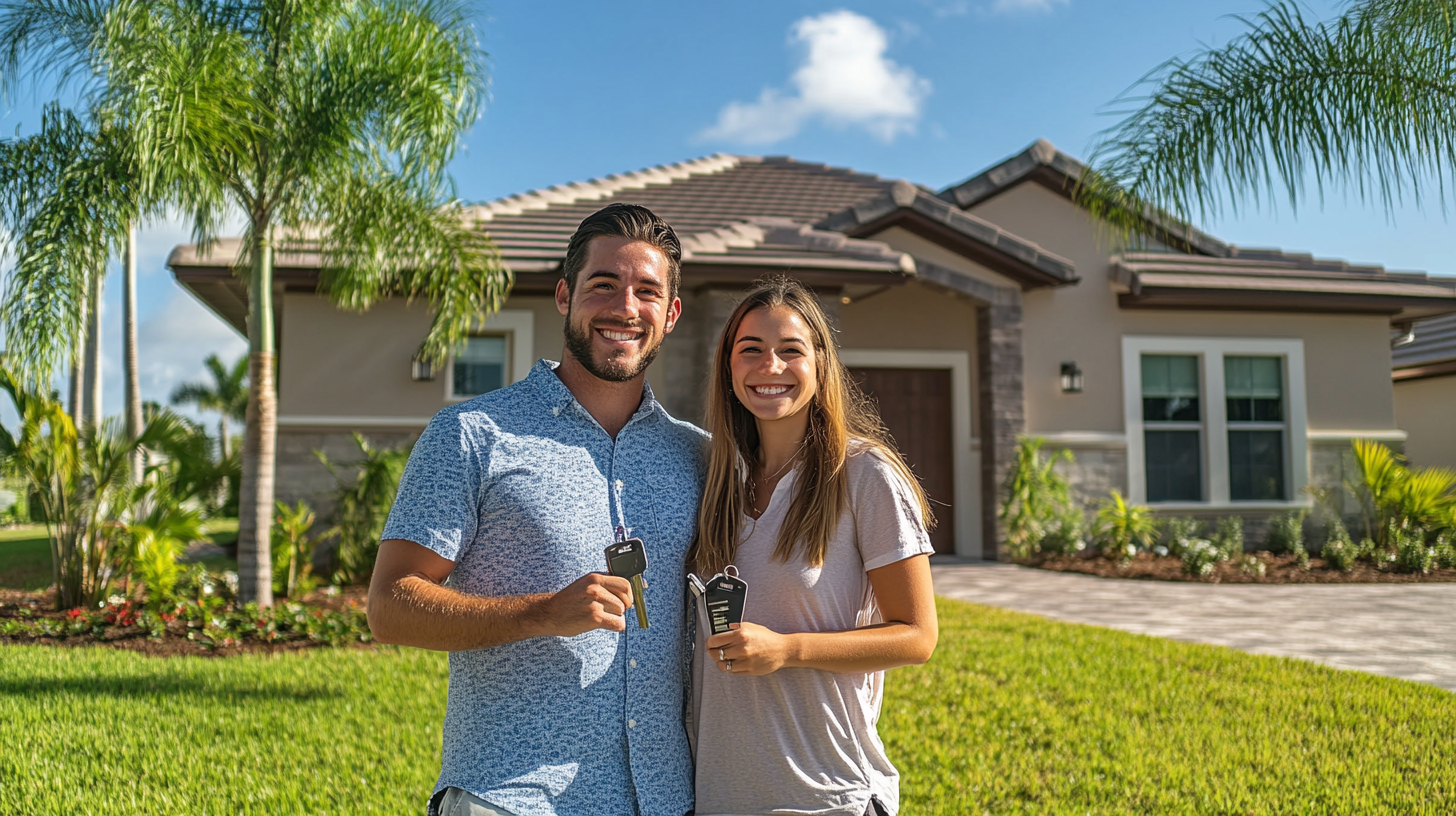So, you’re eyeing Clearwater and wondering whether 2025 is the year you finally ditch the rent check. Good call. Clearwater quietly shifted from “vacation hide-out” to “sneaky-good starter-home market” while most folks were busy arguing about mortgage rates. Stick with me for a few minutes and you’ll walk away knowing:
- what the local numbers really say,
- every down-payment program that still has money left in its pot,
- the mistakes I still see rookies make, and
- how to play the long game so your first place becomes a springboard instead of a financial ankle weight.
Ready? Let’s rip into it.
Clearwater in 2025: More Than Beach Selfies
Florida headlines talk about Miami or Orlando. Quiet little Clearwater keeps humming along, and the stats prove it.
- Average price for a move-in-ready two-bed townhouse: $337,000 as of January 2025.
- Median days on market: 21.
- Percent of purchases using some form of first-time buyer assistance last year: 34 percent.
- Inventory under $400k: up 11 percent compared with 2024, thanks to a mini-boom in new townhome developments east of US-19.
Translation? There’s legit breathing room for newcomers, especially if you’re not married to waterfront condo life.
Types of homes rookies actually buy here:
- 1960s block ranches in Greenbriar or Coachman Ridge.
- Two-story townhomes along Belcher Road.
- The occasional condo in a mid-rise near Drew Street when monthly fees don’t go wild.
Why Clearwater keeps pulling first-timers:
- Commutable distance to both Tampa and St. Pete job hubs.
- Property taxes that still trail Hillsborough County by a hair.
- A track record of 5–7 percent year-over-year appreciation for the last five years, even with the rate roller-coaster.
Local friction points:
- Flood zones. Nearly 18 percent of the city sits in areas where additional flood insurance is required by lenders. That can add $950 or more a year.
- Short-term rental competition. Investors scooped up sections of Island Estates in 2021–22, shrinking supply.
- Insurance inspections. Four-point and wind-mit reports matter more than ever after the 2023 statewide carrier shake-out.
Boring? Maybe, but skip those details and you’ll overpay or get blindsided at closing. Let’s keep moving.
Free Money Does Exist, If You Know Where to Knock
Everyone loves the phrase “down-payment assistance,” yet 40 percent of Clearwater applicants never finish the paperwork. That’s a shame, because 2025 brings a refreshed menu of programs:
- Florida Hometown Heroes – revved up for 2025 with $35,000 in potential zero-interest aid for educators, healthcare workers, first-responders, and—new this year—hospitality employees. Clearwater’s tourism backbone finally paid off.
- Florida Assist (FL Assist) – up to $10,000 toward down payment or closing costs, repayable only when you sell or refi the first mortgage. Income caps sit at roughly 150 percent of area median income, which means a two-person household can earn around $118k and still qualify.
- Pinellas County SHIP – grants that slide on a scale. If your household pulls in 80 percent of median, the county can inject up to $25,000 that never needs to be returned. Funds typically reload in October, so timing matters.
- Mortgage Credit Certificate (MCC) – not a grant but a sneaky-good annual tax credit worth up to $2,000 per year for the life of the loan. You claim it every April and it feels like a free month of mortgage every spring.
- FHA 203(b) + Energy Efficient add-on – think traditional 3.5 percent-down FHA loan, then bolt on up to $6,500 in approved energy-saving upgrades rolled into the mortgage. Hurricane windows, attic spray foam, higher SEER heat pumps. Your future self enjoys lower power bills, and the lender lets you finance the improvements upfront.
Where rookies trip up:
- Assuming “first-time” means you’ve never owned anything. Federal rules say you can be considered first-time after not owning in the last three years. If you sold a condo in 2021 and rented since, you’re back in the game.
- Forgetting about recapture tax language inside some bond-funded loans. Sell too fast at too large a gain and you might owe a slice. Always ask the lender to walk you through worst-case math.
Local assistance sherpas:
- Housing Finance Authority of Pinellas County. Weekly Zoom orientation that breaks every program into plain English.
- Tampa Bay Community Development Corporation in Clearwater. Free credit counseling plus help with that mountain of application forms.
Pro tip: combine programs. I’ve seen buyers layer the Hometown Heroes silent second with an MCC and a seller concession for closing costs. Net out-of-pocket? $1,800. Yes, really.
Street-Level Strategy: Stuff Zillow Won’t Tell You
Look, websites spit out Zestimate figures and call it a day. You need intel that still feels warm from the oven.
- Flood-zone hack: Search for houses built after 2003 in AE zones. Newer construction usually meets base-flood elevation rules, so the annual flood premium can be under $700 instead of $2,400. That difference equals roughly $25k in purchasing power at today’s mortgage rates.
- Insurance inspection timing: Schedule the wind-mit and four-point before the general home inspection window ends. If the inspector flags an undersized electrical panel, you can kick repair requests to the seller before that initial grace period closes. Saves you thousands, plus future headaches finding coverage.
- Utility bills are public record: Email Duke Energy with the address you’re eyeing, ask for the last 12 months of power usage, and you’ll know exactly what you’re walking into. Big data with zero cost.
- Walk the block at 7 a.m. and 10 p.m.: Different vibe equals clarity on parking congestion or nightly noise. The digital tour can’t replicate smell, traffic hum, or how fast morning sprinkler runoff pools at the curb.
On the financing front, 2025 pushes creative structures:
- “2-1 buydown” is still alive. The seller or builder pays upfront points so your rate sits two points lower year one, one point lower year two, then settles at the note rate. In Clearwater, builders on Hercules Avenue already advertise it to clear standing inventory.
- Nonbank lenders offering 1 percent-down conventional loans capped at $275k. A grant covers the other 2 percent, instantly giving you 3 percent down with no mortgage insurance after reaching 20 percent equity. Read the fine print on credit-score tiers, but it’s legit.
Lifestyle fit matters too:
If your commute runs to International Plaza or downtown Tampa, snag a place near the Courtney Campbell Causeway entrance and you’ll shave 15 minutes off the drive. Remote worker? Go inland near Countryside Mall where fiber service from WOW and Spectrum overlap, giving you gig-speed backup if one line acts up.
Tech you actually need:
- MyFloodStatus – plugs an address into FEMA and private maps, then spits out a color-coded risk report.
- Pinellas Property Appraiser GIS layer. Shows homestead exemptions, previous sale sums, even permits. Catch the neighbor who added a porch without final inspection.
- SunRunner and Jolley Trolley schedules. Not glamorous, but if you buy near a route you might laugh at gas prices.
Hidden Costs and Negotiation Playbook
The sticker price isn’t the real number, is it? First-timers routinely forget:
- State doc stamp on deeds, 70 cents per $100 of purchase price. A $350k house = $2,450 that shows up on closing disclosure line 1203, like a ninja fee.
- Intangible tax on new mortgages, two mills, another $700 on that same example.
- Pinellas County sewer connection fee for homes east of Keene Road that flip from septic to municipal lines. Runs roughly $3,000 today.
All fixable if you plan.
Inspection quirks in coastal Florida:
- Aluminum wiring in early-70s ranches. Some carriers want every receptacle pig-tailed with copper wire, around $18 per outlet.
- Cast iron drain lines. Pre-1975 slabs often hide them. A camera scope costs $175 and worth every penny; replacement is five figures.
- Roof age. Insurance carriers want remaining useful life of at least three years on shingle. No, a seller affidavit saying “it doesn’t leak” won’t fly.
Negotiation angles that still work even in a tight market:
- Offer the seller a free post-closing occupancy for up to seven days. Some just need breathing room to finish their own move. You give them calm, they give you price room.
- Cap inspections at seven calendar days but line up contractors in advance. Speed signals confidence; you can always exit if the report screams.
- Escalation clause with a capped ceiling. Example: “Buyer will beat any competing offer by $2,000 up to $365,000.” Keeps you in the race yet protects your budget.
HOA reality check:
- About 62 percent of Clearwater’s planned communities have monthly dues under $250.
- The cheapest usually means you handle your own exterior maintenance.
- Always read the budget and reserve study. You’re hunting for line items like roof reserves or seawall repair allowances. No reserves triggers special assessments, and that’s the fastest way for a “cheaper” townhome to swallow your savings.
Future-Proofing Your Move
You’re buying the mortgage rate but you’re investing in the neighborhood. Here’s how to stack the odds in your favor.
Long-term value plays:
- Look for corridors undergoing streetscape grants. Gulf-to-Bay Boulevard received $22 million in improvements slated through 2026. Trees, bike lanes, fancy lighting. Adjacent parcels typically pop 8–10 percent within two years of completion.
- Zoning whispers. The city’s 2024 comprehensive plan bumps allowable density near the Highland Avenue corridor. Extra units mean builders start knocking on doors for land. Owning a modest house where townhomes may sprout later is the ultimate exit strategy.
Resale mindset:
Never skip the three golden exit factors:
- Two full bathrooms. Even if you’re fine with one, the next buyer likely isn’t.
- Off-street parking. Clearwater issues just 200 on-street overnight permits a year. Private driveway wins.
- Indoor laundry. Florida humidity plus a carport washer equals mildew central. Keep it inside.
Education channels you can tap now:
- The quarterly First-Time Buyer seminar at St. Petersburg College’s Clearwater campus. Lenders, insurance agents, and a home inspector tag-team a three-hour crash course.
- Florida Housing’s YouTube playlist. Bite-sized clips on credit myths, debt-to-income math, and how to stack incentives. Free and surprisingly jargon-free.
Real stories, not theory:
Jared and Mia grabbed a 1978 three-bed on Lakeview Road mid-2023 with $8,200 out-of-pocket after stacking SHIP and MCC. They refinanced in late 2024, yanked out $36k, and are now finishing a garage conversion into an Airbnb-style studio. The original purchase decision—picking a property just outside the strict short-term-rental overlay—now covers half their mortgage each month.
Or Lydia, a nurse at Morton Plant Hospital, who used Hometown Heroes last summer. She intentionally bought near Crest Lake Park because the city just pumped in a skate loop, dog run, and splash pad. Foot traffic soared, a craft-coffee truck parks there every morning, and Zillow now pegs her home 14 percent higher than at closing.
Community connection:
- Join Clearwater Neighborhoods Coalition meetings. They stream on Facebook Live. One hour a month keeps you looped into rezoning requests, public-works projects, even the inevitable debate over speed bumps. Translation: you’ll know first when a new mixed-use development or grocery store is on the docket—and that’s gold for property values.
Ready to Dive In?
You started reading to see whether Clearwater makes sense for a first home. By now, you know it does—if you work the programs, respect the flood map, and negotiate like you’ve done this before.
Next steps that actually move the needle:
- Pull a free credit report tonight and circle errors.
- Register for the next Pinellas County SHIP orientation. Takes 90 minutes.
- Walk three neighborhoods in person this weekend. Morning, afternoon, evening. Make notes.
- Interview two local lenders about pairing Hometown Heroes with an MCC.
Do those four things and you’re already ahead of 80 percent of first-time buyers who keep scrolling listings without a plan.
Clearwater is still under the radar compared with the splashier Florida markets. That’s good news for you. Nail the prep work, line up the assistance dollars, stay laser-focused on inspection and insurance details, and you’ll scoop up a place that not only feels like home but also sets you up for whatever move comes next.
See you at the closing table.












